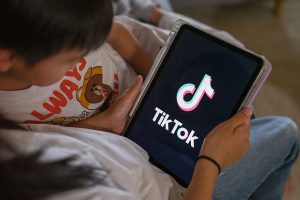Washington, DC
The battle between social-media companies and parents found itself center stage at the Federal Trade Commission, Wednesday. A panel of four speakers discussed the state of play in America’s fight to protect children online – and where it should go.
On the stage at the FTC were Senator Marsha Blackburn of Tennessee; Dawn Hawkins, the National Center on Sexual Exploitation’s senior advisor; Michael Toscano, director of the Family First Technology Institute for the Institute of Family Studies, and Maurine Molak, the founder of David’s Legacy Foundation.
Every day in 2021, 100,000 minors received sexually abusive content from adults on Facebook and Instagram, Blackburn said on the stand, referencing internal documents released by the Department of Justice. Following the release of these documents, Blackburn sponsored the Kids Online Safety Act, or KOSA, which passed in the Senate 91-3. “Seldom do you have legislation as bipartisan as KOSA,” Blackburn said.
However Hawkins espoused her belief that current policy enforcement does very little for parents and their children. “We’re being given a broken flashlight and being told to just find our way in the dark,” she said. “Unless they step up to help us, we can’t monitor better, we can’t just educate better, we have very few tools at our disposal to understand and to equip our children.”
“Parents want the government to get involved. They want safeguards put in place for their kids,” Molak added. Perhaps drawing from personal experience, he then said, “They’re asking for help.” Molak’s 16-year-old son, David, committed suicide in 2016 after “being continuously harassed, humiliated and threatened by a group of students” online.
Drawing from her work at the National Center on Sexual Exploitation, Hawkins described the prevalence of online content which is harmful to children and constantly at their fingertips. “Our social media platforms themselves have more pornography available than if you just tried to go to a hardcore porn website,” Hawkins said, adding that young American children are “facing a crisis.”
“Our young children are being hyper-sexualized,” Hawkins said, pointing at a recent Department of Justice finding that 30 percent of their arrests for child sexual abuse are other children. “They’re acting out what they’re viewing on their peers,” Hawkins said.
The panelists presented several possible solutions to the online attacks against children. Toscano, in addition to pushing for thorough age verification in app stores and increasing the current privacy law’s age of adulthood (which currently sits at 13), advocated for families to develop their own cultures around smartphone usage.
He painted the scene of a family out to dinner together, waiting for their food. But instead of engaging in conversation, each family member’s head was pointed down at their phone’s screen. The dad was perhaps on X, the mom responding to a text from a neighbor, the daughter on Instagram and the son watching NBA highlights. “The conditions for a happy family must include not only physical presence but also mental presence,” Toscano said.
“You give to your spouse the gift of your attention, and if every member of the family is being driven down one highly individualized rabbit hole after another, you’re not actually occupying a common world together,” he said. “No family ultimately can be happy without having a common world.”
A core frustration parents have in attempting to manage their children’s social media consumption is that desired solutions feel largely out of reach. And worse, many of the solutions Big Tech does present them with have loopholes that children and adults alike can wiggle through. Somewhat hyperbolically, Toscano described the parent-Big Tech conflict as “a behemoth unlike anything we’ve ever confronted in terms of corporate scope and power in the history of the world.”


























Leave a Reply